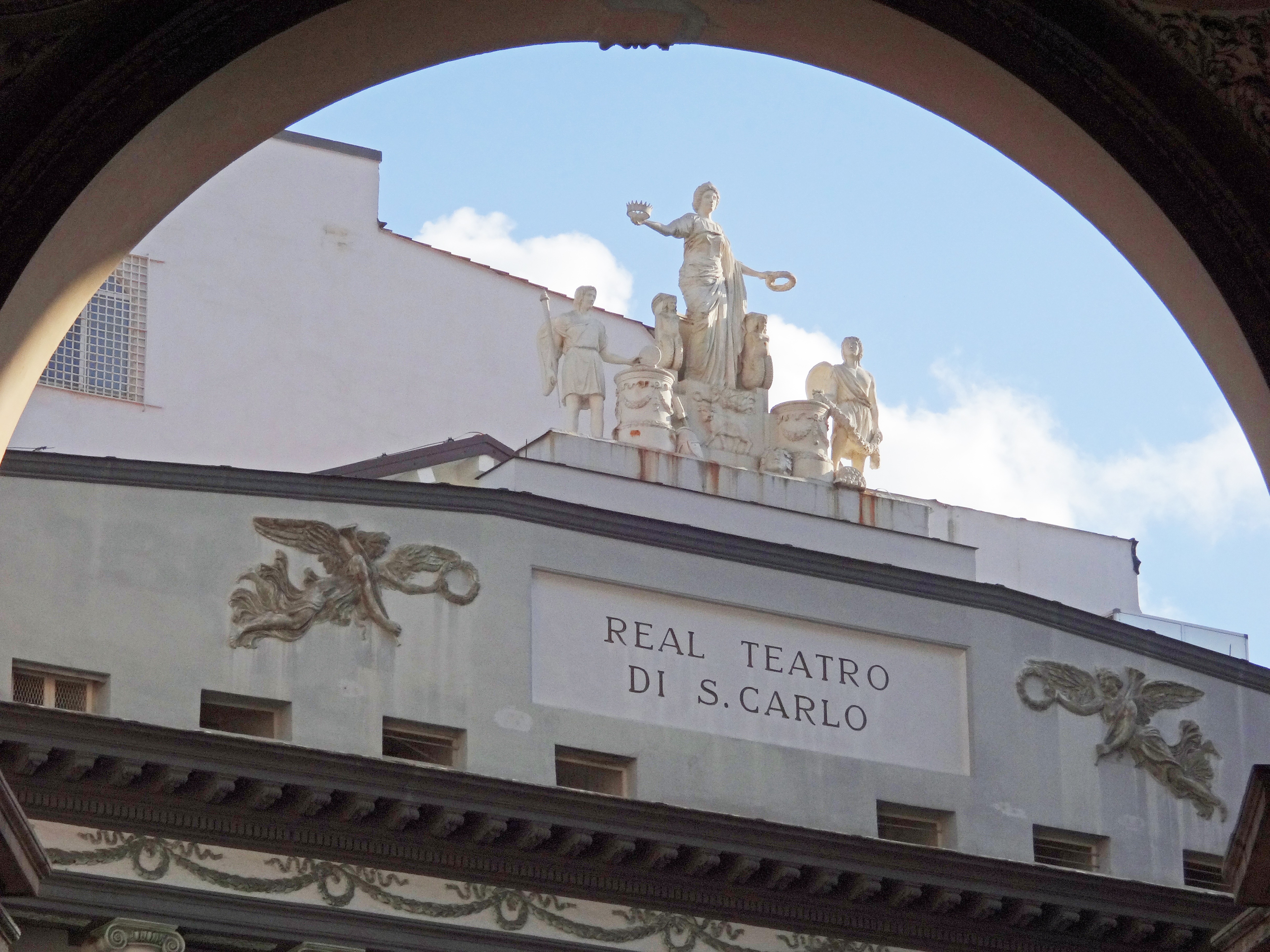|
Raffaele Mirate
Raffaele Mirate (3 September 1815 – November 1895) was a celebrated Italian operatic tenor who had an active career from the 1830s through the 1860s. Known for his intelligent phrasing and bright and powerful vocal timbre, he was regarded as an outstanding interpreter of the tenor roles in the early and middle period operas of Giuseppe Verdi. He notably created the role of the Duke of Mantua in the world premiere of Verdi's ''Rigoletto'' in 1851. He was also a highly regarded interpreter of bel canto roles, excelling in the operas of Vincenzo Bellini, Gaetano Donizetti, and Gioachino Rossini. Biography Born in Naples, Mirate was a pupil of Alessandro Busti and the famous castrato Girolamo Crescentini at the Regio Collegio di Musica. His first opera performance was in a school production in 1834. His official opera début came three years later at the Teatro Nuovo in Naples as the title hero in Donizetti's ''Torquato Tasso''. From 1836 through 1839 he worked primarily in Naples ... [...More Info...] [...Related Items...] OR: [Wikipedia] [Google] [Baidu] |
Naples
Naples (; it, Napoli ; nap, Napule ), from grc, Νεάπολις, Neápolis, lit=new city. is the regional capital of Campania and the third-largest city of Italy, after Rome and Milan, with a population of 909,048 within the city's administrative limits as of 2022. Its province-level municipality is the third-most populous metropolitan city in Italy with a population of 3,115,320 residents, and its metropolitan area stretches beyond the boundaries of the city wall for approximately 20 miles. Founded by Greeks in the first millennium BC, Naples is one of the oldest continuously inhabited urban areas in the world. In the eighth century BC, a colony known as Parthenope ( grc, Παρθενόπη) was established on the Pizzofalcone hill. In the sixth century BC, it was refounded as Neápolis. The city was an important part of Magna Graecia, played a major role in the merging of Greek and Roman society, and was a significant cultural centre under the Romans. Naples served a ... [...More Info...] [...Related Items...] OR: [Wikipedia] [Google] [Baidu] |
La Scala
La Scala (, , ; abbreviation in Italian of the official name ) is a famous opera house in Milan, Italy. The theatre was inaugurated on 3 August 1778 and was originally known as the ' (New Royal-Ducal Theatre alla Scala). The premiere performance was Antonio Salieri's ''Europa riconosciuta''. Most of Italy's greatest operatic artists, and many of the finest singers from around the world, have appeared at La Scala. The theatre is regarded as one of the leading opera and ballet theatres globally. It is home to the La Scala Theatre Chorus, La Scala Theatre Ballet, La Scala Theatre Orchestra, and the Filarmonica della Scala orchestra. The theatre also has an associate school, known as the La Scala Theatre Academy ( it, Accademia Teatro alla Scala, links=no), which offers professional training in music, dance, stagecraft, and stage management. Overview La Scala's season opens on 7 December, Saint Ambrose's Day, the feast day of Milan's patron saint. All performances must end befor ... [...More Info...] [...Related Items...] OR: [Wikipedia] [Google] [Baidu] |
Teatro Di San Carlo
The Real Teatro di San Carlo ("Royal Theatre of Saint Charles"), as originally named by the Bourbon monarchy but today known simply as the Teatro (di) San Carlo, is an opera house in Naples, Italy, connected to the Royal Palace and adjacent to the Piazza del Plebiscito. It is the oldest continuously active venue for opera in the world, having opened in 1737, decades before either Milan's La Scala or Venice's La Fenice."The Theatre and its history" on the Teatro di San Carlo's official website. (In English). Retrieved 23 December 2013 The opera season runs from late November to July, with the ballet season taking place from December to early June. The house once had a seating capacity of 3,285, but has now been reduced to 1,386 seats. Given its size, structure and antiquity, it was the model for theatres that were l ... [...More Info...] [...Related Items...] OR: [Wikipedia] [Google] [Baidu] |
Giovanni Pacini
Giovanni Pacini (11 February 17966 December 1867) was an Italian composer, best known for his operas. Pacini was born in Catania, Sicily, the son of the buffo Luigi Pacini, who was to appear in the premieres of many of Giovanni's operas. The family was of Tuscan origin, living in Catania when the composer was born. His first 25 or so operas were written when Gioachino Rossini dominated the Italian operatic stage. But Pacini's operas were "rather superficial", a fact which, later, he candidly admitted in his ''Memoirs''.Rose 2001, in Holden, p. 650 For some years he held the post of "director of the Teatro San Carlo in Naples." Later, retiring to Viareggio to found a school of music, Pacini took time to assess the state of opera in Italy and, during a five-year period during which he stopped composing, laid out his ideas in his Memoirs. Like Saverio Mercadante, who also reassessed the strength and weaknesses of this period in opera, Pacini's style did change, but he quickly becam ... [...More Info...] [...Related Items...] OR: [Wikipedia] [Google] [Baidu] |
Francesco Malipiero
Francesco Malipiero (9 January 1824 - 12 May 1887) was an Italian composer. He was the father of conductor and pianist Luigi Malipiero and the grandfather of composer and musicologist Gian Francesco Malipiero. Trained in Venice, he composed a large number of operas; many of which premiered at La Fenice. He also wrote several symphonic works, sacred songs, chamber music Chamber music is a form of classical music that is composed for a small group of instruments—traditionally a group that could fit in a palace chamber or a large room. Most broadly, it includes any art music that is performed by a small numb ..., and art songs. Selected works *''Giovanna prima Regina di Napoli'' (1841) *''Alberigo da Romano'' (1846) *''Fernando Cortez'' (1851) References 1824 births 1887 deaths Italian classical composers Italian male classical composers Italian opera composers Male opera composers 19th-century classical composers 19th-century Italian composers 19th-century Ita ... [...More Info...] [...Related Items...] OR: [Wikipedia] [Google] [Baidu] |
Antonio Buzzolla
Antonio Buzzolla (2 March 1815 – 20 March 1871) was an Italian composer and conductor. A native of Adria, he studied in Venice Venice ( ; it, Venezia ; vec, Venesia or ) is a city in northeastern Italy and the capital of the Veneto Regions of Italy, region. It is built on a group of 118 small islands that are separated by canals and linked by over 400 ..., and later worked with Gaetano Donizetti and Saverio Mercadante. He composed five operas, but was better known in his lifetime for Aria, ariettas and canzonettas in the Venetian dialect. Beginning in 1855 he served as the ' of the Cappella Marciana at St Mark's Basilica in Venice. Buzzolla was one of the composers invited by Giuseppe Verdi to contribute to the ''Messa per Rossini''; he composed the opening movement, the ''Requiem e Kyrie''. He died in Venice in 1871. Compositions Sacred Works * ''Messa a quattro parti e piena orchestra'' * ''Requiem a quattro'' * ''Requiem aeternam e Kyrie'' della ' ... [...More Info...] [...Related Items...] OR: [Wikipedia] [Google] [Baidu] |
La Donna è Mobile
"" (; "Woman is fickle") is the Duke of Mantua's canzone from the beginning of act 3 of Giuseppe Verdi's opera ''Rigoletto'' (1851). The canzone is famous as a showcase for tenors. Raffaele Mirate's performance of the bravura aria at the opera's 1851 premiere was hailed as the highlight of the evening. Before the opera's first public performance (in Venice), the aria was rehearsed under tight secrecy: a necessary precaution, as "" proved to be incredibly catchy, and soon after the aria's first public performance it became popular to sing among Venetian gondoliers. As the opera progresses, the reprise of the tune in the following scenes contributes to Rigoletto's confusion as he realizes from the sound of the Duke's lively voice coming from the tavern (offstage) that the body in the sack over which he had grimly triumphed was not that of the Duke after all: Rigoletto had paid Sparafucile, an assassin, to kill the Duke, but Sparafucile had deceived Rigoletto by indiscriminately ki ... [...More Info...] [...Related Items...] OR: [Wikipedia] [Google] [Baidu] |
La Fenice
Teatro La Fenice (, "The Phoenix") is an opera house in Venice, Italy. It is one of "the most famous and renowned landmarks in the history of Italian theatre" and in the history of opera as a whole. Especially in the 19th century, La Fenice became the site of many famous operatic premieres at which the works of several of the four major bel canto era composers – Rossini, Bellini, Donizetti, Verdi – were performed. Its name reflects its role in permitting an opera company to "rise from the ashes" despite losing the use of three theatres to fire, the first in 1774 after the city's leading house was destroyed and rebuilt but not opened until 1792; the second fire came in 1836, but rebuilding was completed within a year. However, the third fire was the result of arson. It destroyed the house in 1996 leaving only the exterior walls, but it was rebuilt and re-opened in November 2004. In order to celebrate this event the tradition of the Venice New Year's Concert started. Hist ... [...More Info...] [...Related Items...] OR: [Wikipedia] [Google] [Baidu] |
Carlo Boniforti
Carlo is a given name. It is an Italian form of Charles. It can refer to: *Carlo (name) *Monte Carlo *Carlingford, New South Wales, a suburb in north-west Sydney, New South Wales, Australia *A satirical song written by Dafydd Iwan about Prince Charles. *A former member of Dion and the Belmonts best known for his 1964 song, Ring A Ling. *Carlo (submachine gun), an improvised West Bank gun. * Carlo, a fictional character from Animal Crossing: Pocket Camp * It can be confused with Carlos * Carlo means “man” (from Germanic “karal”), “free man” (from Middle Low German “kerle”) and “warrior”, “army” (from Germanic “hari”). See also *Carl (name) *Carle (other) *Carlos (given name) Carlos is a masculine given name, and is the Portuguese and Spanish variant of the English name ''Charles'', from the Germanic ''Carl''. Notable people with the name include: Royalty *Carlos I of Portugal (1863–1908), second to last King of P ... {{disambig Italian ... [...More Info...] [...Related Items...] OR: [Wikipedia] [Google] [Baidu] |
Napoleone Moriani
Napoleone Moriani (10 March 1808 – 4 March 1878) was an Italian operatic tenor, appearing in opera houses throughout Europe. Life Moriani was born in Florence in 1808. He came from a wealthy family, and he studied law at the University of Pisa, intending to become a lawyer. Since his tenor voice was well regarded in society, he tried an operatic career: his debut, in Pavia at the Teatro dei Condomini in 1833, was successful."Moriani, Napoleone" ''Treccani''. Retrieved 13 August 2022. During the following years he appeared on stage in many Italian cities, and from 1840 elsewhere in Europe: in Vienna at the , in Germany including Dres ... [...More Info...] [...Related Items...] OR: [Wikipedia] [Google] [Baidu] |
Francesco Maria Piave
Francesco Maria Piave (18 May 18105 March 1876) was an Italian opera librettist who was born in Murano in the lagoon of Venice, during the brief Napoleonic Kingdom of Italy. Career Piave's career spanned over twenty years working with many of the significant composers of his day, including Giovanni Pacini (four librettos), Saverio Mercadante (at least one), Federico Ricci, and even one for Michael Balfe. He is most well known as Giuseppe Verdi's librettist, for whom he was to write 10 librettos, the most well-known being those for ''Rigoletto'' and ''La traviata''. But Piave was not only a librettist: he was a journalist and translator in addition to being the resident poet and stage manager at La Fenice in Venice where he first encountered Verdi. Later, Verdi was helpful in securing him the same position at La Scala in Milan.Baldini 1970, pp. 70 - 74 His expertise as a stage manager and his tact as a negotiator served Verdi very well, but the composer bullied him mercilessly ... [...More Info...] [...Related Items...] OR: [Wikipedia] [Google] [Baidu] |
Giovanna D'Arco
''Giovanna d'Arco'' (''Joan of Arc'') is an operatic ''dramma lirico'' with a prologue and three acts by Giuseppe Verdi set to an Italian libretto by Temistocle Solera, who had prepared the libretti for ''Nabucco'' and ''I Lombardi''. It is Verdi's seventh opera. The work partly reflects the story of Joan of Arc and appears to be loosely based on the play ''Die Jungfrau von Orleans'' by Friedrich von Schiller. Verdi wrote the music during the autumn and winter of 1844/45 and the opera had its first performance at Teatro alla Scala in Milan on 15 February 1845. This opera is not to be confused with Rossini's cantata of the same name, which was composed in 1832 for contralto and piano, and runs approximately 15 minutes. Libretto By the middle of the 19th century, the story of Joan of Arc had served as the basis for many operas, including those of Nicola Vaccai (1827) and Giovanni Pacini (1830), both of which were strongly reminiscent of Schiller's play. Solera was asked by Verdi ... [...More Info...] [...Related Items...] OR: [Wikipedia] [Google] [Baidu] |




_-_Facade.jpg)


